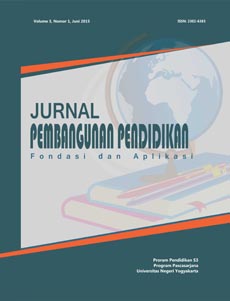The effect of instructional leadership on student's active and learning outcomes
DOI:
https://doi.org/10.21831/jppfa.v9i1.40316Keywords:
Instructional leadership, learning activity, learning outcomes, principalAbstract
References
Bafadal, I., Juharyanto Juharyanto, Nurabadi, A., & Gunawan, I. (2018). Principal leadership and its relationship with student learning achievements: A regression analysis. 3rd International Conference on Educational Management and Administration (CoEMA 2018). https://doi.org/10.2991/coema-18.2018.38
Bush, T. (2008). Leadership and management development in education. Sage Publications Ltd.
Covey, S. R., & Whitman, B. (2010). Fí¼hren unter neuen Bedingungen: sichere Strategien fí¼r unsichere Zeiten. GABAL Verlag GmbH.
Flores, M. A. (2018). Teacher resilience in adverse contexts: Issues of professionalism and professional identity (M. Wosnitza, F. Peixoto, S. Beltman, & C. F. Mansfield (eds.); pp. 167–184). Springer International Publishing. https://doi.org/10.1007/978-3-319-76690-4_10
Gill, R. (2011). Theory and practice of leadership (2nd ed.). SAGE Publications.
Hallinger, P. (2005). Instructional leadership and the school principal: A passing fancy that refuses to fade away. Leadership and Policy in Schools, 4(3), 221–239. https://doi.org/10.1080/15700760500244793
Hallinger, P., & Murphy, J. (1985). Assessing the instructional management behavior of principals. The Elementary School Journal, 86(2), 217–247. https://doi.org/10.1086/461445
Marhawati, B. (2020). Pelaksanaan supervisi akademik kepala sekolah dasar: Studi kualitatif. JMSP (Jurnal Manajemen Dan Supervisi Pendidikan), 4(2), 71–76. https://doi.org/10.17977/um025v4i22020p071
Marks, H. M., & Printy, S. M. (2003). Principal leadership and school performance: An integration of transformational and instructional leadership. Educational Administration Quarterly, 39(3), 370–397. https://doi.org/10.1177/0013161X03253412
Meiers, M. (2014). Teacher professional learning, teaching practice and student learning outcomes: Important issues. In Handbook of Teacher Education (pp. 409–414). Springer. https://doi.org/10.1007/1-4020-4773-8
Mette, I. M., Range, B. G., Anderson, J., Hvidston, D. J., Nieuwenhuizen, L., & Doty, J. (2017). The wicked problem of the intersection between supervision and evaluation. International Electronic Journal of Elementary Education, 9(3 SE-Articles), 709–724. https://www.iejee.com/index.php/IEJEE/article/view/185
Rawi, M. A. Bin. (2013). Leadership on technical and vocational education in community college. Journal of Education and Practice, 4(21), 21–23. https://www.iiste.org/Journals/index.php/JEP/article/view/8267
Smith, S. C. (1997). School leadership: Handbook for excellence (P. K. Piele (ed.); 3rd ed.). ERIC Clearinghouse on Educational Management.
Sopian, A. (2016). Tugas, peran, dan fungsi guru dalam pendidikan. Raudhah Proud To Be Professionals : Jurnal Tarbiyah Islamiyah, 1(1), 88–97. https://doi.org/10.48094/raudhah.v1i1.10
Ubben, G. C., Hughes, L. W., & Norris, C. J. (2001). The principal: Creative leadership for effective schools. Allyn and Bacon.
Werang, B. R. (2014). Pengaruh kepemimpinan transformasional kepala sekolah, moral kerja guru, dan kepuasan kerja terhadap kinerja guru SDN di Kota Merauke. Cakrawala Pendidikan, 33(1), 128–137. https://doi.org/10.21831/cp.v1i1.1869
Whitehead, B. M., Boschee, F., & Decker, R. H. (2013). The principal: Leadership for a global society. SAGE Publications, Inc.
Witter, L. S. (2020). Effects of aromatherapy on academic success, perceived stress, and coping skills of graduate students [Minnesota State University, Mankato]. https://www.proquest.com/openview/efa6947d5ced48f2b1112589b996bf06/1?pq-origsite=gscholar&cbl=18750&diss=y
Downloads
Published
How to Cite
Issue
Section
Citation Check
License
The Authors submitting a manuscript do so on the understanding that if accepted for publication, copyright publishing of the article shall be assigned to Jurnal Pembangunan Pendidikan: Fondasi dan Aplikasi
 | Jurnal Pembangunan Pendidikan: Fondasi dan Aplikasi by https://journal.uny.ac.id/index.php/jppfa is licensed under a Creative Commons Attribution-ShareAlike 4.0 International License. |















